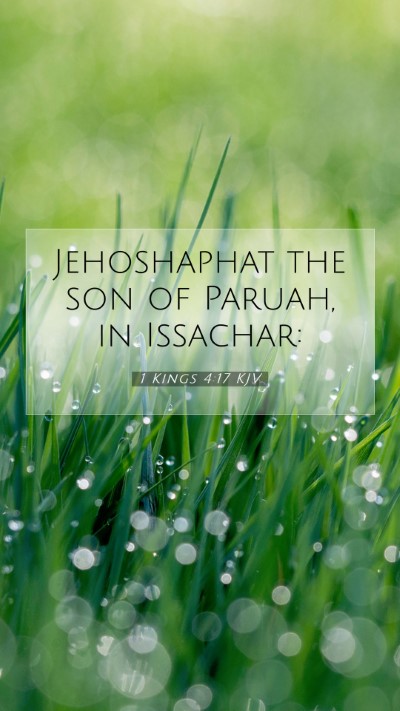Meaning and Interpretation of 1 Kings 4:17
1 Kings 4:17 states, "Jehoshaphat the son of Paruah, in Issachar; and Shaul the son of a man from Reuben." This verse lists key officials in King Solomon's administration, specifically two of the twelve district governors. The listing of these names not only highlights the organization of Solomon's reign but also reflects on the inclusiveness of his governance, drawing from various tribes of Israel.
Understanding this verse requires a closer examination of its historical and spiritual context.
Historical Context
During the reign of King Solomon, Israel experienced a period of peace and prosperity. The structure outlined in this verse illustrates the systemic organization that was necessary for effective governance in a kingdom expanding both politically and geographically. This management is typical for ancient regimes where geographical accountability was crucial.
Commentary Insights
- Matthew Henry: Henry emphasizes that the naming of officials represents divine order within the land, stressing that God had appointed these individuals to ensure a just reign. Each governor bore responsibilities associated with their respective tribes, indicating a God-driven order of leadership.
- Albert Barnes: Barnes outlines the political significance of having governors from different tribes, thus ensuring fair representation. The mention of Jehoshaphat and Shaul serves to remind the Israelites of their shared responsibility under Solomon’s kingship and divine purpose for leadership.
- Adam Clarke: Clarke points out that such leadership roles were pivotal in maintaining not only the peace but also the unity of the tribes. He interprets this verse as symbolic of the collaborative efforts required to uphold a God-fearing society.
Spiritual Insights
This passage underscores the importance of leadership in the community and the divine appointment of authority figures. It reflects the biblical principle that authority, when exercised in service to God and the people, fosters peace and prosperity. Through this text, we learn that every role within a community has significance and is intended to contribute to the greater good.
Cross References
- Exodus 18:21 - Establishing leaders among the people.
- 1 Chronicles 28:1 - Solomon's assembly of leaders.
- Proverbs 11:14 - Importance of wise counsel in leadership.
Application in Life
This verse teaches us about the importance of recognizing authority as part of God's plan. In studying biblical leadership, we see how effective governance benefits the community, urging us to appreciate those who serve in leadership roles. Reflecting on this passage can inspire us to not only accept leadership but also to strive to embody the qualities of a good leader ourselves.
Conclusion
1 Kings 4:17 serves as an important reminder of God’s order and design for leadership. The commentary from respected biblical scholars underscores the need for governance in accordance with divine principles, emphasizing inclusivity and the overarching goal of uniting the people in service to God. By understanding this verse in its context, we gain deeper insights into the significance of biblical governance and its applications in contemporary society.
Further Study
For those looking to dive deeper into biblical studies, consider exploring:
- Online Bible study resources focusing on Old Testament leadership.
- Bible study guides on the themes of governance in the scripture.
- In-depth Bible verse analysis surrounding the reign of Solomon.


